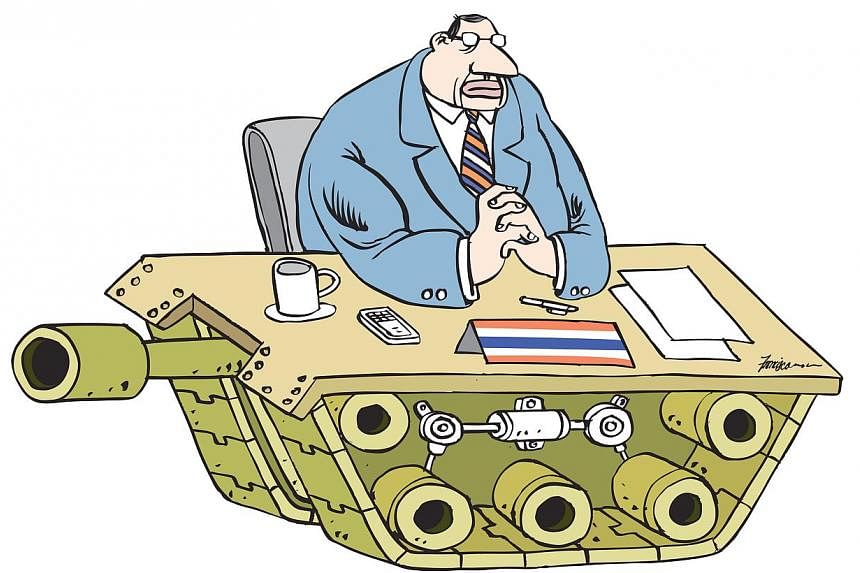AS THAILAND'S putsch on 22 May is being converted into a military government in civilian clothes, at issue is how far the Thai clock can be turned back. Domestic constraints and international parameters are now crucial in setting a tone and direction that will keep Thailand safe from outright military rule and ensure the return of democratic governance.
In the immediate post-coup aftermath, the generals under the National Council for Peace and Order (NCPO) had a free hand to institute policy reforms and bureaucratic purges at the expense of the ousted government of Ms Yingluck Shinawatra and her self-exiled brother, Thaksin Shinawatra, who is also a deposed former leader. Some policies involving public investment projects were retained, albeit reinvented and relaunched. This was particularly so in the case of infrastructure development spending.
But a host of top bureaucrats in the civilian and military and police sectors were also replaced with those the NCPO deemed as having more integrity and not loyal to Mr Thaksin and his Pheu Thai party machine. Martial law has been maintained throughout, but in reality only opponents of the coup and the resulting military government have been targeted.
Domestic constraints
THE interim Constitution that was put in motion two months after the coup, however, was a turning point because it demonstrated the NCPO's determination to maintain absolute power and to control post-coup outcomes for the long term. This means controlled constitutional provisions and perhaps even electoral outcomes beyond the pledged return to democratic rule by the end of next year. Article 44 gives ultimate authority to NCPO chief Prayuth Chan-ocha above and beyond the executive, legislative and judicial branches.
Another article stipulates the directions and contours of the new, permanent Constitution, and a related article suggests that Constitution-drafting can be an open-ended exercise. In other words, if the NCPO does not like the draft charter, it can jettison it and start all over again.
The NCPO-picked National Legislative Assembly (NLA) was also stacked with pro-coup loyalists.
More than half of the 200 NLA appointments were drawn from active or retired top brass of the armed forces. Some time before Sept 30, when General Prayuth's term as army chief ends and the new fiscal year begins, the NLA can therefore be expected to choose him as interim prime minister.
The chosen prime minister will then be likely to install a range of military figures in the Cabinet, together with a small group of technocrats in economy-related ministries. Both the highly-touted National Reform Council and the Constitution Drafting Committee are likely to maintain the coup prerogatives of keeping corruption at bay by marginalising the role of former elected politicians and political parties as much as possible.
These manoeuvres are reverting to Thailand's past by prioritising the role of the civilian and military bureaucracy, especially the army.
After decades of economic development, the Thai electorate is unlikely to tolerate a blatant military dictatorship without some semblance of democratic rule. But democratic forms will be reshaped in a way that shifts power away from elected representatives in favour of appointees from outside the electoral system who are supposedly less corrupt and more effective in administering the country.
To what extent Thais will accept a democratic and electoral apparatus guided by the military remains to be seen. This is the potentially explosive point of contest between pro-coup and pro-democracy forces. Turning the clock too far back could cause irreconcilable tension and conflict.
International parameters
INTERNATIONAL reactions will be critical in setting the parameters. Already the Thai coup has generated geopolitical ripples, eliciting different responses from the great powers.
Western countries, particularly the United States, criticised the coup at the outset. But since then they have not ratcheted up the rhetoric. Asian governments, with notable exceptions such as Tokyo's initial expression of "grave concern" and similar caution from Jakarta and Manila, have greeted Thailand's military intervention with a business-as-usual posture.
With Thailand set to be ruled by its top brass at least for the next year, at issue now are the coup implications for the geopolitical rivalry between the United States and China and the broader prospects of democratisation in developing Asia. If Thailand's military rulers become entrenched, the development may embolden militaries elsewhere.
So far, the United States, Australia and the European Union have been critical of the coup. They have been reviewing military exercises, suspending military education and imposing visa bans on coup leaders. In response, Thailand's military-backed government has looked instead to its Asian neighbours, especially China, for recognition and support.
Although Thailand is not a formal ally of China, Beijing is diplomatically and geopolitically close to Bangkok.
For centuries, Thailand has benefited from being China's virtual next-door neighbour without a common border and the accompanying territorial disputes. The Chinese government recognised Thailand's latest coup, as it did the preceding putsch in 2006, within several working days.
Coup leaders have also officially visited Beijing and received a high-level Chinese business delegation.
China and the West
THE difference between China's approach to Thailand and that of the West becomes more stark whenever Bangkok takes a more authoritarian turn. But when democratic rule prevails, Beijing is also close and supportive. In other words, the Chinese, feeling no obligation to support democratic institutions, have found ways to be Thailand's all-weather friend.
More recently, Thailand has become even more important to China. Myanmar's reforms have led to a loss of Chinese dominance in the Mekong region, and Cambodia's see-saw election in July 2013 weakened the pro-Beijing regime of Prime Minister Hun Sen. Meanwhile, in the maritime domains, both vis-a-vis Japan in the east and the Philippines and Vietnam in the south, China's assertive territorial claims are fiercely contested and somewhat constrained by the US' military presence.
Losing influence in Myanmar and Cambodia can be offset by drawing closer to an increasingly authoritarian Thailand.
If China's southern maritime flank is unstable, its southern mainland tip must be secured. Thailand is thus a key piece of China's geostrategic jigsaw.
Much of what happens on Asia's geopolitical canvas will depend on how post-coup Thailand plays out. If genuine democratic rule is restored after a period of pervasive and systematic military control over politics and economy, Thailand may regain its geopolitical balance. But if authoritarianism solidifies at the expense of democratic legitimacy, the country's rulers may be forced to lean on Beijing for support.
Asian democracies
WITH democratisation and geopolitics entwined, Asian democratic voices are needed to nudge Thailand towards a geopolitical balance and a democratic future. While Philippine and Indonesian leaders demonstrated their democratic instincts at the outset, other Asian democratic governments, particularly South Korea and India, could make a big difference by standing up for democracy.
Such a move would also be consistent with their geostrategic interest in encouraging China to play by the rules to deepen regional institutionalisation and architecture-building.
The problem is that Thailand's top brass also appear resolute. The chilling onset of military rule in civilian clothes is thus likely to pose a conundrum for the international community for some time to come.
The writer teaches international political economy and directs the Institute of Security and International Studies at Chulalongkorn University in Bangkok.


